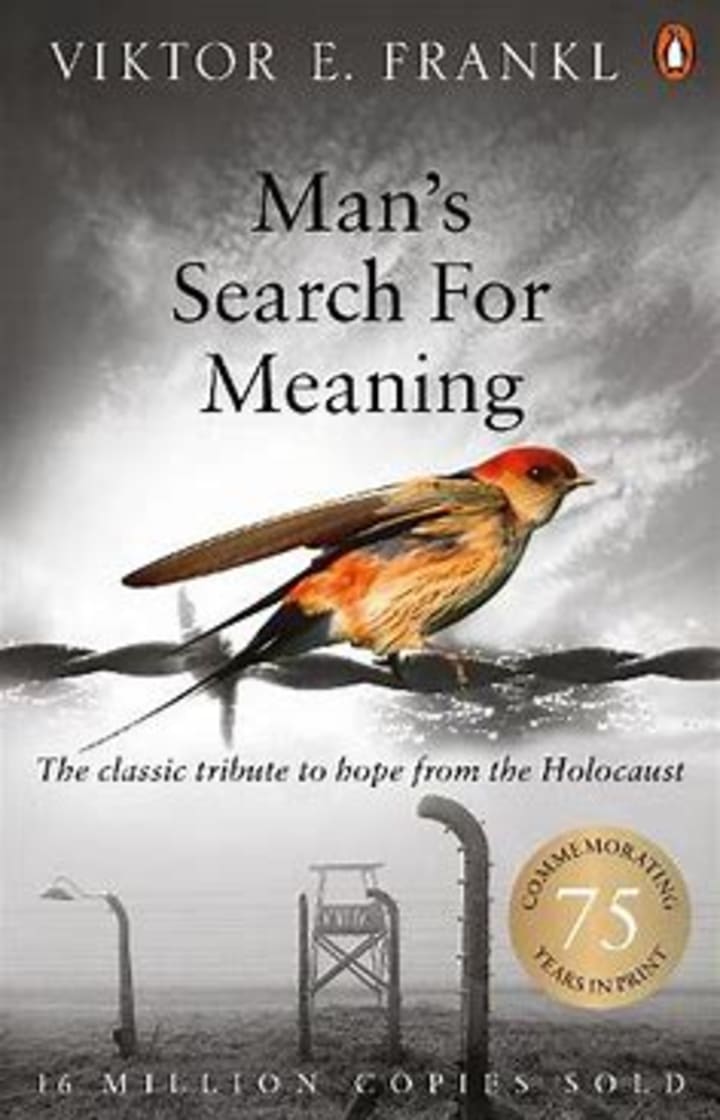
In the darkest corners of history, where humanity faced the depths of despair and suffering, one man emerged with a profound message of hope and resilience. "Man's Search for Meaning" by Viktor E. Frankl is a timeless testament to the triumph of the human spirit in the face of unimaginable adversity. Published in 1946, this seminal work chronicles Frankl's experiences as a Holocaust survivor and delves into the depths of human psychology, offering insights into the quest for meaning and purpose that drives us all.

The Author: Viktor E. Frankl
Viktor Emil Frankl was an Austrian neurologist, psychiatrist, and philosopher born in Vienna in 1905. Growing up in a family of academics, he was immersed in an environment of intellectual pursuits and curiosity. Frankl's interest in psychology led him to study medicine and specialize in neurology and psychiatry.
At the age of 16, he encountered Sigmund Freud's work, which sparked his fascination with the complexities of the human mind. Frankl soon became involved in existential psychotherapy, emphasizing the importance of finding meaning in life. His passion for psychology and existential philosophy culminated in the development of a therapeutic approach known as logotherapy, based on the belief that the primary motivation in human life is the search for meaning.
Tragically, Frankl's life took a harrowing turn when he, along with his family, was sent to Nazi concentration camps during World War II. Despite enduring unimaginable horrors, he managed to survive and use his experiences as a foundation for his life's work.

The Holocaust and Logotherapy
In 1942, Viktor Frankl, his parents, and his pregnant wife, Tilly Grosser, were deported to the Theresienstadt Ghetto and later transferred to Auschwitz and other concentration camps. Tragically, Frankl's parents and wife did not survive the Holocaust. The profound suffering he witnessed and experienced during his time in the camps shaped the core principles of logotherapy.
Throughout the darkest moments of his imprisonment, Frankl observed that those who clung to a sense of purpose and meaning in their lives were more likely to endure the dehumanizing conditions. He found that individuals who maintained a reason to live—whether it was a desire to reunite with loved ones, complete a work of art, or contribute to humanity—were better equipped to overcome adversity.
These experiences formed the foundation of his belief that finding meaning in life is essential for mental and emotional well-being, even in the most desperate circumstances. Frankl's observations became the basis for his therapeutic approach, logotherapy, which he developed and later integrated into his classic work, "Man's Search for Meaning."
The Essence of "Man's Search for Meaning"
"Man's Search for Meaning" is divided into two parts, each offering a unique perspective on the human experience and the quest for purpose.
Part I: Experiences in a Concentration Camp
The first part of the book is a vivid and deeply moving account of Frankl's experiences in the concentration camps. He describes the brutality, suffering, and degradation endured by the prisoners, as well as the profound psychological impact of the traumatic environment.
Despite the inhumane conditions, Frankl highlights the resilience of the human spirit and the capacity of individuals to find meaning even in the face of extreme suffering. He observes that those who managed to survive did so by holding onto a sense of purpose, a future goal, or a higher meaning that gave them the strength to endure.
Frankl introduces the concept of "tragic optimism," emphasizing that while one cannot always change external circumstances, they can choose their attitude toward those circumstances. In the face of unimaginable horrors, individuals still possess the power to choose how they respond to their circumstances and find meaning in their lives.
Part II: Logotherapy in a Nutshell
In the second part of the book, Frankl introduces logotherapy as a therapeutic approach that emphasizes the search for meaning as the primary motivation in human life. He contrasts logotherapy with other schools of psychotherapy, such as psychoanalysis and behaviorism, which focus on the pursuit of pleasure or the avoidance of pain.
Logotherapy posits that striving to find meaning and purpose is fundamental to human nature. It encourages individuals to discover meaning through their unique experiences, relationships, and creative expressions. Frankl suggests that the search for meaning can be found in three primary ways:
1. Through Work and Actions: Engaging in meaningful work and creative endeavors can provide individuals with a sense of fulfillment and purpose.
2. Through Love and Relationships: Meaning can be discovered in deep connections with others, in our capacity to love and be loved.
3. Through Courage in the Face of Suffering: Even in the midst of suffering, individuals can find meaning by courageously enduring and learning from their experiences.
Frankl also introduces the concept of the "existential vacuum," which refers to the emptiness and lack of meaning experienced by individuals who are unable to find a purpose in life. He contends that this vacuum can lead to various psychological and emotional issues, including feelings of meaninglessness and despair.
The Impact of "Man's Search for Meaning"
"Man's Search for Meaning" has left an indelible mark on countless readers worldwide, transcending cultural and generational boundaries. Its enduring impact can be attributed to several key factors:
1. Universality of Human Experience: Frankl's insights into the human condition and the search for meaning resonate with people from all walks of life. The book offers wisdom and guidance to individuals facing various challenges and seeking to find purpose in life.
2. Testimony of Triumph Over Adversity: As a Holocaust survivor, Frankl's personal story of resilience and hope amid the horrors of the concentration camps serves as an inspiring example of the human spirit's capacity to endure and overcome adversity.
3. Groundbreaking Therapeutic Approach: Logotherapy, as introduced in the book, is a revolutionary therapeutic approach that focuses on the pursuit of meaning and purpose as a path to mental and emotional well-being.
4. Shift in Psychotherapy Paradigm: "Man's Search for Meaning" contributed to a shift in the psychotherapy paradigm by emphasizing the importance of meaning and purpose in psychological well-being. It expanded the scope of therapeutic practices to consider existential and spiritual dimensions in treatment.
5. Philosophical Reflections: Beyond its therapeutic implications, the book offers philosophical reflections on the human experience, freedom of choice, and the pursuit of a meaningful life.
The Relevance in Modern Times
Nearly eight decades after its initial publication, "Man's Search for Meaning" remains as relevant as ever. In the fast-paced, technology-driven world of today, individuals still grapple with existential questions and the quest for purpose and fulfillment. The book's enduring relevance can be seen in various domains:
1. Mental Health and Resilience: In the face of modern stressors and challenges, the search for meaning remains a vital aspect of mental health and resilience. Frankl's insights continue to guide mental health professionals and individuals seeking to develop a sense of purpose and coping strategies.
2. Work-Life Balance: With the increasing emphasis on work-life balance and job satisfaction, Frankl's emphasis on meaningful work and engagement resonates with individuals seeking fulfillment in their careers.
3. Spirituality and Existential Reflections: In an era where individuals explore spirituality and existential questions, "Man's Search for Meaning
3. Spirituality and Existential Reflections: In an era where individuals explore spirituality and existential questions, "Man's Search for Meaning" offers a profound exploration of the human spirit's yearning for meaning and purpose. The book serves as a guiding light for those on a spiritual journey, seeking deeper connections and a sense of purpose beyond material pursuits.
4. Coping with Uncertainty and Change: In times of uncertainty and rapid change, the search for meaning becomes even more crucial. Frankl's teachings encourage individuals to embrace change and find stability in the pursuit of purpose, helping them navigate the complexities of life with greater resilience.
5. Overcoming Adversity: The book's enduring popularity is a testament to its capacity to inspire individuals facing adversity. Frankl's message of hope and courage resonates with those dealing with personal challenges, loss, and trauma, providing a roadmap to find meaning even in the most challenging circumstances.
6. Finding Balance in a Digital Age: In a world characterized by constant connectivity and digital distractions, "Man's Search for Meaning" reminds us of the importance of being present and engaging in meaningful activities. It encourages individuals to look beyond superficial pleasures and instead seek fulfillment through genuine connections and purposeful pursuits.
7. Relationship Building: The book's emphasis on empathy, compassion, and meaningful connections is invaluable in cultivating healthy and fulfilling relationships. By understanding the significance of authentic human interactions, individuals can create stronger bonds with others and enhance their overall well-being.
8. Cultivating Mindfulness: Frankl's observations about the power of living in the present moment align with modern mindfulness practices. By focusing on the here and now, individuals can cultivate a deeper appreciation for life and find meaning in everyday experiences.
9. Leadership and Influence: Leaders seeking to inspire and influence others can draw valuable lessons from "Man's Search for Meaning." Understanding the impact of purposeful leadership can foster a sense of collective meaning and motivation among teams and organizations.
10. Legacy of Compassion and Tolerance: Frankl's experiences during the Holocaust serve as a reminder of the consequences of hatred and intolerance. His advocacy for compassion and understanding continues to resonate, urging individuals to reject prejudice and embrace empathy.
Criticism and Controversy
Despite its widespread acclaim, "Man's Search for Meaning" has not been without criticism and controversy. Some critics argue that Frankl's perspective is overly optimistic and may not apply to all situations or individuals facing extreme suffering. Additionally, there have been discussions about the use of Holocaust narratives in psychological and philosophical works and the ethical considerations involved in interpreting such experiences.
However, it is essential to recognize that "Man's Search for Meaning" is not a manual for how to endure the Holocaust or any other extreme hardship. Instead, it is a profound exploration of the human psyche, the search for meaning, and the resilience of the human spirit. Frankl's insights are grounded in his unique experiences but extend beyond them, providing a broader framework for understanding the human condition.
Conclusion
Viktor E. Frankl's "Man's Search for Meaning" remains a profound and timeless exploration of the human spirit's capacity to find meaning and purpose, even in the darkest of circumstances. Through his experiences as a Holocaust survivor and his development of logotherapy, Frankl offers a profound testament to the triumph of the human will, the significance of individual choice, and the resilience of the human spirit.
The book's impact spans generations and continues to resonate with readers across the globe. It serves as a beacon of hope and inspiration, guiding individuals through the complexities of life, and reminding us of the power of meaning in fostering mental and emotional well-being.
In a world facing numerous challenges, "Man's Search for Meaning" holds valuable lessons for individuals seeking purpose, fulfillment, and personal growth. It is a reminder that even in the face of adversity, we possess the power to shape our attitudes, find meaning in our experiences, and forge a path toward a meaningful and purposeful life.
As we immerse ourselves in Frankl's reflections on the human spirit, we are invited to explore our own search for meaning and reflect on the values and beliefs that guide our lives. In the quest for purpose, we find the essence of what it means to be human—a profound journey into the depths of our souls, where we discover the power to transform suffering into hope and meaning.
About the Creator
Gokila
She is an astrophile, introvert,
loves to read books all day long,
addicts in healthy lifestyle
and having curiosity to know about new things.
Life Is As Beautiful As You Make It. Contentment Is The Key To Happiness. Peace Be Upon The Saviour.






Comments
There are no comments for this story
Be the first to respond and start the conversation.